Did Moses Really Fight a Pharoah Named Ramses to Free the Israelites?

If there is any Old Testament we easily remember, it is the Exodus 1-14 story about the Israelites escaping Egypt. If you’re like me, you grew up watching The Prince of Egypt, where the ruler that Moses goes toe-to-toe with is named Ramses. However, between the movies, Sunday School lessons, and church plays, we may forget that liberties always get taken in retellings.
So, we need to ask: did Moses go against Ramses when he returned to Egypt? Or is there something we have unintentionally overlooked? Let’s crack open our Bibles. Let’s explore the historical context to see what we really know.
What Do We Know about the Pharaoh Named Ramses?
For those needing a refresher, the pharaoh of Egypt was a king with a dynasty to uphold, carry out, and eventually prepare for their next of kin. Some pharaohs saw themselves as gods or descendants of the gods—not an unusual ancient belief, as we see from rulers of kingdoms like the Persian Empire and Roman Empire. But was Ramses? There are several options that we must consider.
As Britt Mooney of Christianity.com points out, “The most famous pharaoh named Ramses in ancient Egypt was Ramses II, also known as Ramses the Great or Ramesses II. Ancient Greek historians called him Ozymandias . . . His grandfather was Ramses I, and his father was Seti I. While Ramses II is not explicitly named in the biblical account of Moses, many scholars and historians believe he could have been the Egyptian ruler mentioned in the biblical story.”
Mooney then explains that scholars believe Rameses II reigned during Egypt’s nineteenth dynasty, around the traditional Exodus timeframe.
Other scholars speculate that Merneptah I (1234?-1214 BC) was the Pharaoh during Exodus. He is known as the Pharaoh of the nineteenth Egyptian dynasty and likely the thirteenth son of Rameses II. Francis E. Gegot reflects this view in his article for the Catholic Encyclopedia. He argues that Exodus 2:23 and 4:19 may “imply that the immediate successor of that Pharaoh was on the throne when Moses returned to Egypt where he soon delivered his people. Whence it is unnaturally inferred that Mernephtah I, Ramses’ son and successor, is the Pharaoh of the Exodus.”
While some believe Exodus occurred during the twelfth century BC, while others speculate it happened a century later. This comes from the historical records during the reign of King Akhenaten—a Pharaoh considered a heretic because he believed in monotheism instead of Egypt’s traditional polytheism. It is recorded that Akhenaten built a city from mud bricks. While cheaper and quicker than stonework, the city would still require extensive work, which historians speculate could be the slave work that the Israelites finished.
After Akhenaten’s death, the well-known King Tutankhamun (aka King Tut) took the throne from 1334-1325 BC. As Stephen Rosenberg puts it in the Jerusalem Post, the date of King Tutankhamun’s reign “fits in well with the two dates given in the Tanakh (Hebrew Bible)]. It says that the Children of Israel were in Egypt for 430 years (Exodus 12:40), which would place their entry in about 1760 BCE, which corresponds in time to the entry of the Hyksos from Syria, with whom the ancient historian Josephus links the Israelites. And, according to the book of Kings 6:1, the Temple of Solomon was built 480 years, which means 12 Biblical generations, after the Exodus.”
To summarize, we aren’t completely certain who ruled Egypt before and during the Exodus. Ancient history isn’t always clear due to wars, natural disasters, or great mysteries and miracles. However, this should not discourage us as Christians (more on that later).
Who First Suggested that Moses and Ramses Opposed Each Other?
After diligent research, finding the person who suggested the idea of Moses and Ramses II opposing each other is anyone’s guess. What we can say, however, is that movies played a big role in making this idea popular.
We can first see this with The 10 Commandments (1923), where Rameses is cast as Moses’ foster brother. A little over 30 years later, the classic 1956 movie (also titled The 10 Commandments and directed by Cecil B. DeMille) did the same thing. The 1956 version became a huge box office success and remains well-remembered for its costumes, sets, and the thousands of gallons used to give the illusion of the Red Sea parting.
Another classic adaption, mentioned earlier, is The Prince of Egypt, an animated film released in 1998. Like the two DeMille movies, it accurately depicts the burning bush, plagues and Red Sea crossings but fictionalizes the relationship dynamic. Moses and Ramses’ relationship becomes a brother-brother rivalry with violent consequences.
The more recent movie, Exodus: Gods and Kings, appeared in 2014 and played on the idea that Ramses was the pharaoh of Egypt during the Exodus. While less successful, it continued the popular impression that Moses and Ramses knew each other.
We often forget that pop culture impacts our perspective on history in good and bad ways.
Given the multiple possibilities and speculations about who was Pharaoh during the time of Moses, it is safe to say that this liberty is not a long-term problem. Also, Moses vs. Pharaoh has a nice ring to it.
Would Moses and Ramses Have Grown Up Together?
As previously mentioned, movies such as The Prince of Egypt highlight the relationship between Moses and Ramses II, from young children to their later adult years. As Mooney puts it:
“The Bible paints a less detailed picture of Moses and the pharaoh he confronts. It mentions one Pharaoh’s daughter taking him out of a basket in the Nile River and that he grew up in the royal household. Specific details (whether he grew up with Ramses or a different Egyptian prince, how they related to each other) do not appear.”
To further cover this, we must look at the possible age gap. Assuming Ramses II was Moses’ brother after his adoption from the Nile River, we are not given his age at the time. It is also unclear whether Ramses II had any other siblings. For all we know, they may not have been near the same age. Even if they were, royal duties (and potential other siblings we don’t know about) mean they may not have been close.
We also recognize that, as Francis Gigot mentions in his entry, these may be two different pharoahs. Moses was reportedly in his forties when he murdered an Egyptian for striking an enslaved Israelite (Exodus 2:11-12). It is also reported that Moses was 80 years old when he spoke to the Pharoah (Exodus 7:7). Meanwhile, the general life expectancy of an ancient Egyptian male was roughly 30-40 years.
Of course, the ruling class often lived longer. In an article for the American Society of Overseas Research, Grigorios Kontopoulo explains how much longer an Egyptian noble might have lived:
“Although the evidence suggests a quite low life expectancy, there were exceptions of individuals who reached substantial old age. These fortunate ones were usually members of the Egyptian elite. Several cases of individuals who reached—or who wished to reach—a long lifespan were attested in ancient Egyptian literature. Although the majority of texts reflected the experiences of the literate male elite, several examples dated during the Dynastic period (such as the famous Papyrus Westcar from the Middle Kingdom, ca. 2000 BCE) indicate that 110 years seemed to be the ideal lifespan.”
There are exceptions to this rule—such as King Tutankhamun, who died before 20 years of age. Still, it’s possible that whoever the Pharaoh was when Moses left was still ruling when Moses returned. Unfortunately, we cannot say for sure.
Should It Worry Us if Moses and Ramses Aren’t Both in the Bible?
Sometimes, we may worry that we are “doubting the Scriptures” when we ask why it doesn’t give us a definitive, black-and-white answer. The truth is that we don’t need to worry about not having every single answer we want. What we are given in the Bible is what we are given. It tells us what we need to know—not necessarily everything we want to know.
Just because we don’t have every single detail to every question we ask about the Bible does not downgrade or delegitimize our faith. If anything, looking at the historical records of Egypt and others (such as historian Josephus during the time of the Apostles) helps enhance our faith. It shows us the Bible is more internally consistent than most ancient records. It provides an opportunity to grow in our faith as we do the research to answer tough questions. That is Apologetics 101.
Movie adaptations are great. The Prince of Egypt is still my favorite Bible story adaptation). They can help us understand the Bible story’s context and consider the biblical figures’ personalities. But we must remember that every film adaptation, and I mean every film adaptation, of a historical figure or period will take some liberties. This is true whether the romanticizing of “the good ol’ days” of the 1950s to “when men were men” during the Greco-Roman period. If we are not careful, we let those liberties dominate what we believe and don’t delve into the actual history.
Photo Credit: © Getty Images/Merydolla

This article is part of our People from the Bible Series featuring the most well-known historical names and figures from Scripture. We have compiled these articles to help you study those whom God chose to set before us as examples in His Word. May their lives and walks with God strengthen your faith and encourage your soul.
4 Things You May Not Know About Abraham in the Bible
20 Facts You May Not Know About Moses from the Bible
Who Was Mary Magdalene in the Bible?
Who Were the 12 Disciples of Jesus?
Who Was Isaiah & Why Was He Important?
Originally published January 12, 2024.





